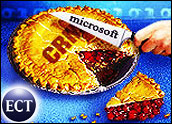
The mantra of selling solutions has taken enterprise software by storm and nowhere is this more prevalent than CRM. Honestly, it seems like the more challenging and difficult it is to sell into specific sectors of CRM, the more “solution-selling” is being invoked. This newfound religion is truly transforming some companies away from being purely product-centric to being problem-centered on their customers’ broken business processes first. The most positive aspect of solution selling’s prevalence among the best-of-breed CRM community is that it is starting to make a difference.
The best-of-breed vendors walking the solutions talk also have generated a side benefit to solutions selling that no one is really talking about — integrity. Amazing as it sounds, I don’t think enough companies really stop and think about the long-term implications that giving themselves the label of “solution seller” without earning it would have on their integrity. In fact it’s just as easy for a company to claim it is “customer focused” as it is for for it to say it’s focused on solution selling — without actually being either.
Desperate for a Quick Fix
What’s unsettling and troublesome is that so many CRM vendors, in trouble with thinning pipelines and competitors from the SaaS world nipping at their heels including Salesforce.com at the low-end and mid-range of the market, jump to solution selling without thinking about how to build integrity in the process.
The bottom line is that solution selling for today’s troubled CRM vendors is just like the “Hail Mary” long pass in football, often thrown in the last seconds of a half or game, hoping someone on their team will come down with a signed deal in the end zone. One of the many problems with seeing solution selling as the “quick fix” to major problems is that it comes across just like that to prospects and clients alike. The proof comes in the execution, not in landing the deal.
The companies getting the best results from solution selling are doing these tasks not just to get them done, but with a lot of focus and effort behind them to make their solutions trustworthy. At the heart of solution selling with integrity is the earning of trust, which can be done in several ways:
- Populate roadmaps with products you can WebEx today showing integration. A sure sign a company is solution selling with integrity is that they have reality-based roadmaps. Every application, whether licensed or hosted, can be demonstrated on WebEx, and the systems integrated with it can also be seen anywhere on the planet, anytime, through a simple WebEx window. That’s impressive. It’s solution selling and it’s making many companies practicing this worthy of trust. Finally, prospects say to themselves, this is a vendor who “gets it” and shows me what is shipping. Not to belabor the point, but you have to respect Steve Jobs’ quote “Real artists ship,” reminding his staff that delivering working products on time is as important as innovation and killer designs.
- Solution selling is not an excuse to jack up services fees to 10X or higher that of license costs. There are those software companies that will announce solution selling as their core focus with much fanfare, only to surprise prospects and clients with a revamped pricing model that takes services costs through the roof. Instead of focusing on selling more services with a solution selling label on it, try to deliver more services at the same license-to-services ratio, earning trust in the process. The bottom line is that by doing this you will be way ahead of competitors who will look to solution selling as a strategy to drive up deal sizes.
- Modify sales’ compensation plans to reflect long-term selling solutions strategies over just flipping deals. This is by far the toughest step for many companies to take because it directly impacts revenue in the short-term, but it’s necessary to give sales reps the chance to go deep into accounts and look for problems to solve rather than just the next license sale needed. Revising compensation plans to reward the annuity stream of revenue from a solution also solves a major sales management issue — turnover.
- Quit dating your customers and marry them. There’s a big difference here as one is transitory and the other is long-term (except in Nevada). One is focused on seeing what works with little investment and the other is a complete investment.
- Making a strategy contribution means more than just trimming costs. The best solutions sold end up as strategies that create continual value for clients. If there is a best practices thread in all this, it is this: solution selling that creates value is what it’s really all about. Sure, software gets sold to just do sales force automation, service management, call center operations and even cross-channel coordination. Yet none of these applications matter long-term in any company until they attain strategy status and create value in the form of measured results.
Bottom line: Solution selling starts when you find a way to become critical to your customers’ roadmaps, strategies, plans and future. Look for those mile markers and populate your CRM system with them, and you’ll truly be selling solutions with integrity.
Louis Columbus, a CRM Buyer columnist, is a former senior analyst with AMR Research. He is the author of several books on making the most of analyst relationships, including Best Practices in Analyst Relations, which can be downloaded for free.












































